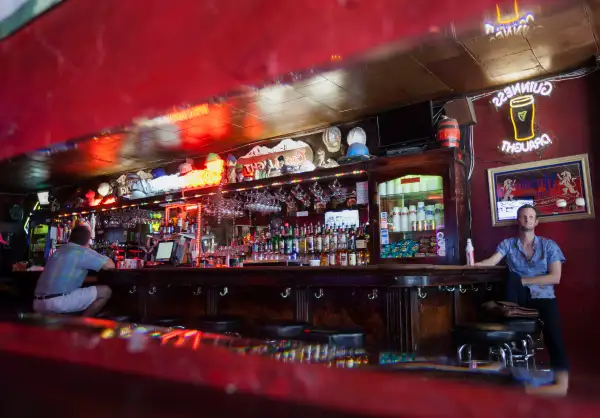Let Us Pause and Mourn the Loss of Cheap Dive Bars All Over the U.S.

The days of drinking $2 Pabst tall-boy cans to bad rock 'n roll covers may be over. The bathroom graffiti, the jukeboxes, and the darts, too. Soon, it'll all be gone, even the large vinyl signs behind the stage that announce the punny names of bands you'll never Google, unless you somehow end up asking one to play your wedding. Across the country, dive bars are disappearing.
Every major city that's seeing major economic development is losing its dive bars. Los Angeles, San Francisco, New York, Miami, Chicago, and even Boston are all racking up impressive casualty lists, and the rapid decline in dive bar culture is conjuring up mixed emotions.
This week, the Boston Globe is mourning the loss of dive bars in the city. The affordability, community, and casual, anything-goes nature of dive bars is fading in Boston as it has in other metropolises, as coffee shops and slick, fancier establishments go up where the weathered bars and stools spent decades. To regulars and even just residents comforted by their somewhat shady presence, a city's dive bars are deeply entwined with a city's soul, and losing them for the sake of laptop-heavy coffeeshops and nouveau-fast food chains is a shame.
Skyrocketed urban real estate prices and rents in many cities are being blamed for killing off dive bars. There are changing tastes at work, too. The trendy young professional millennials who overwhelmingly desire to live in cities and most likely to reside in urban neighborhoods once clogged with dive bars are quite different than the regulars of old racking up monthly tabs of Olde Style, Pabst, or 'Gansett tall-boy cans. The new locals prefer craft cocktails, IPAs, smoothies, and lattes instead.
The Globe offered a poignant view of these changing tastes by way of Yelp reviews of some classic watering holes. "There were about four old men in here, one sleeping loudly at the end of the bar," read one Yelper, who gave the place five stars in 2011. While some of the new residents that can afford high city rents may appreciate the "charm" of such a place, this sort of decor generally doesn't seem to be in style anymore. Overall, according to the Globe, roughly 20 of the 70 establishments included in the 2011 book Boston's Best Dive Bars are now closed.
In most cases, however, it's impossible to keep tabs dive bar openings and closings: Data is almost fundamentally at odds with the cash-only dive bar culture. But if the articles that signal closings are any indication, the cancer is stage four. In Los Angeles earlier this month, the "last of Westwood's dive bars" closed with the shuttering of O'Hara's, to the consternation of the cash-strapped UCLA students and old regulars who the bartenders knew by name. An Italian chain restaurant is taking its place.
Read next: 5 Great Things That Beer Does for America
Even Detroit is losing its last pool hall as urban "revitalization" flows through the motor city as trendy eateries and boutiques swoop in.
The death of the old, salty bars shouldn't be confused with a canary in the coal mine. It's a last-man-standing kind of thing, and it's not hard to see the chain restaurants, hip new bars, third-wave coffee shops, and the like bearing down. So maybe go raise a final pint while you can. And tip the barkeep well.